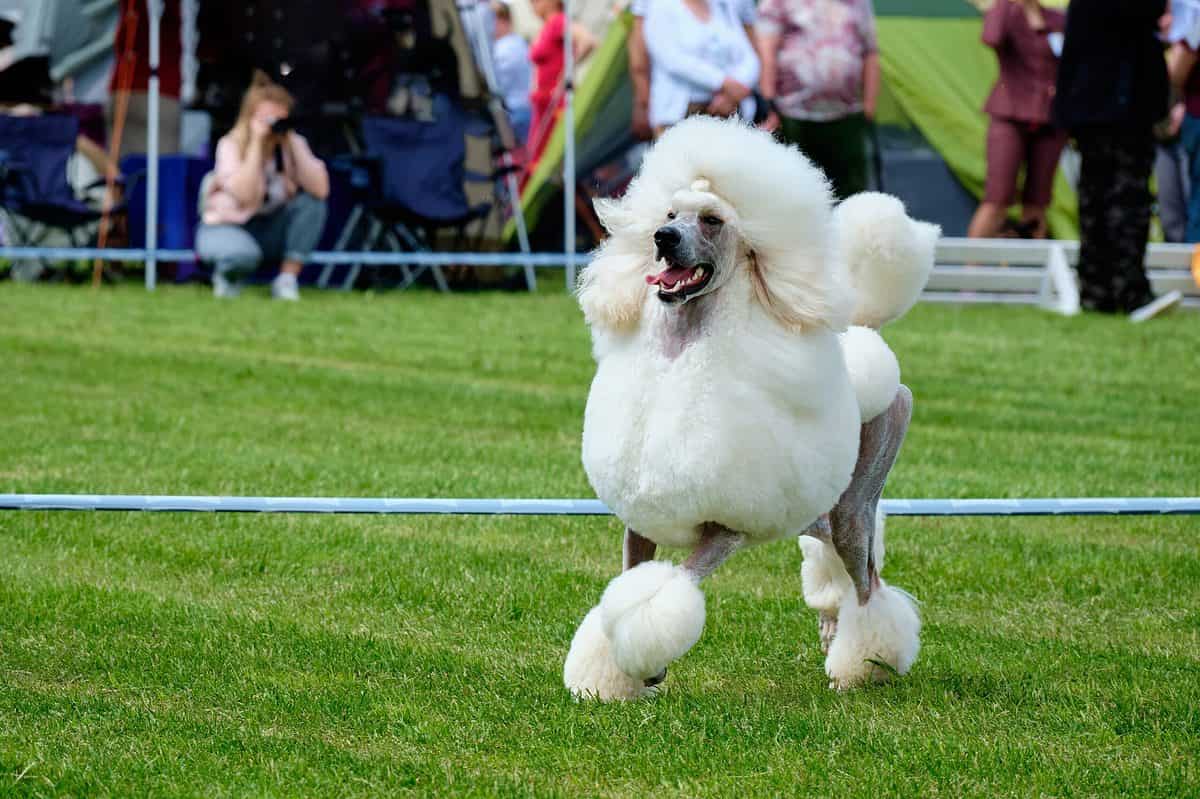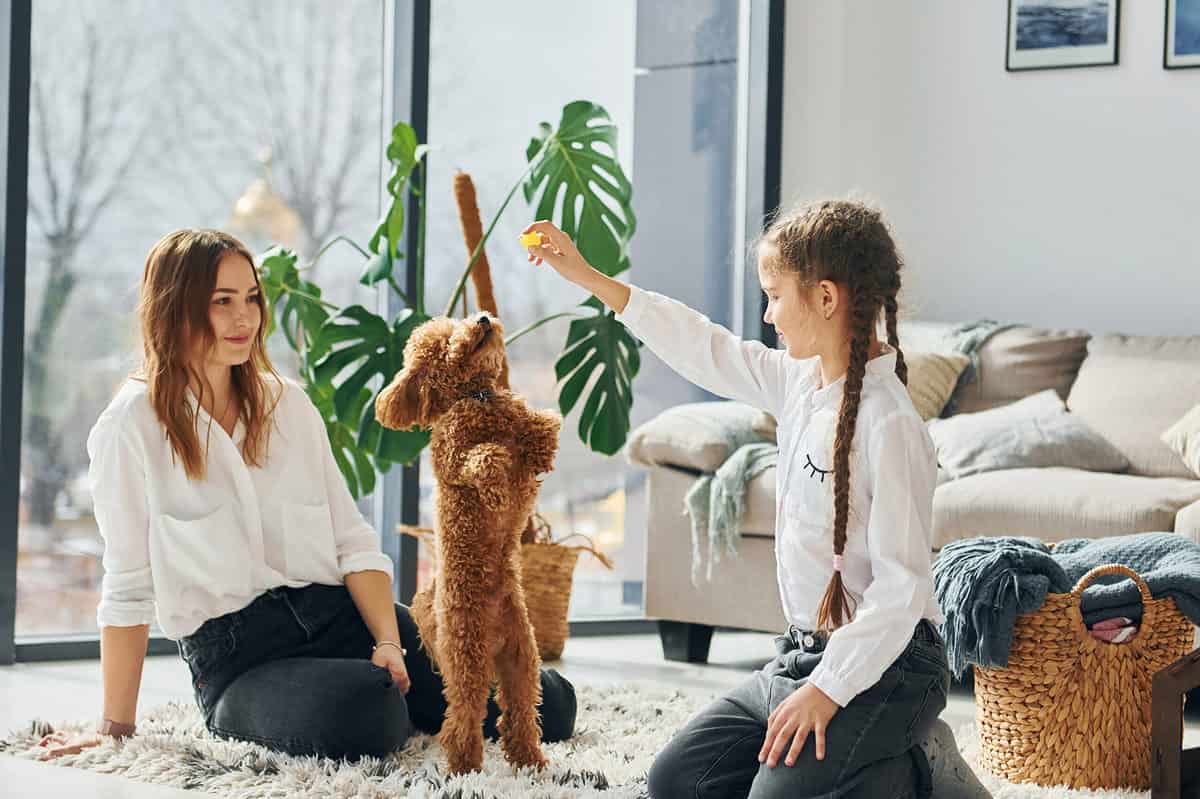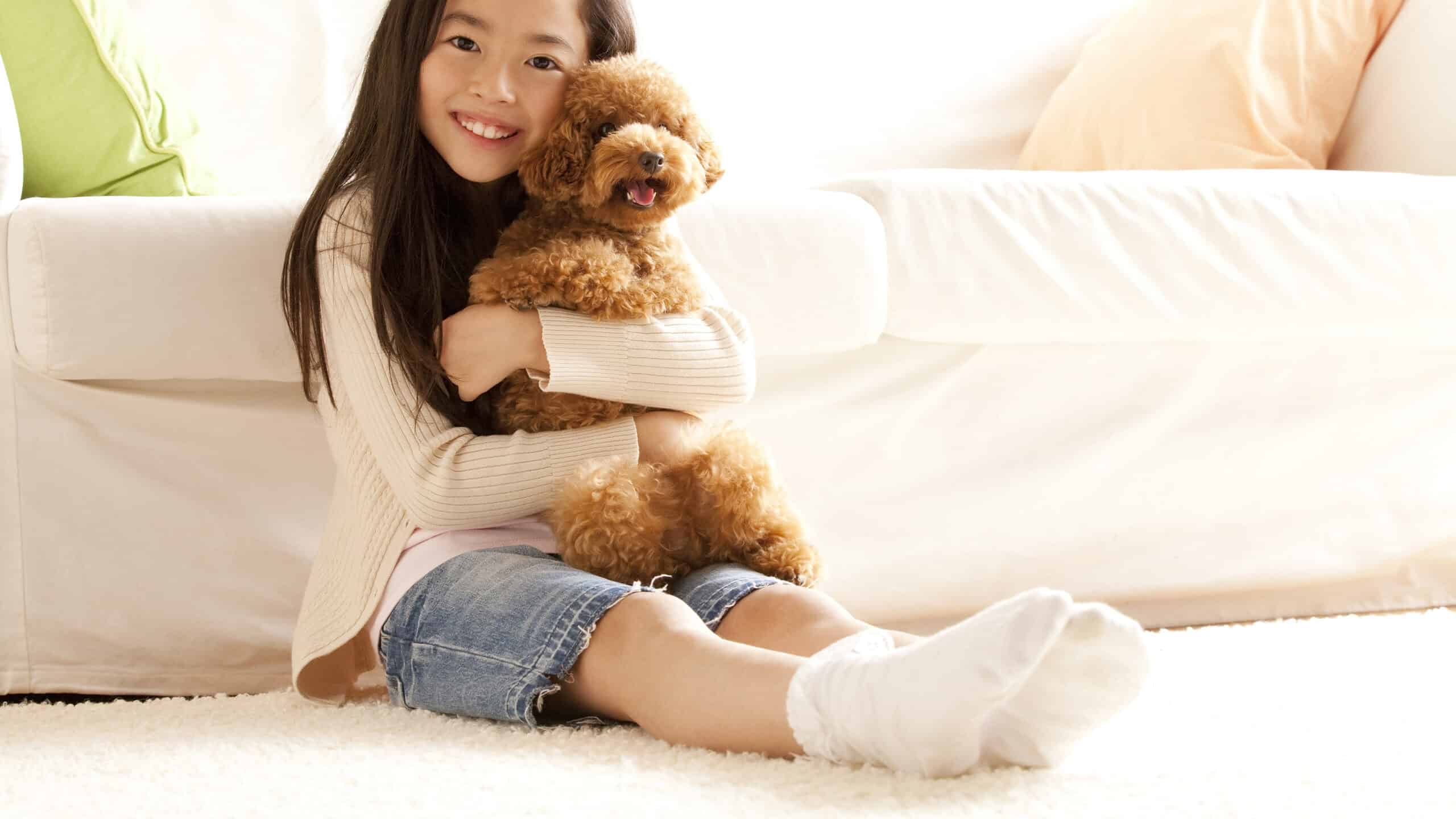Poodles are popular for their talent, charisma, and showmanship. They are elegant show dogs who love attention. You can often see poodles with their beautiful coats groomed in elegant styles. Poodles are people-oriented and energetic. With their affectionate demeanor and loyalty, you may ask yourself, are poodles good with kids? If you are considering adopting a poodle into your family, you have come to the right place! It is always necessary to research the breed you are thinking about before introducing it to your child.
Key Points
- Poodles are among the most intelligent dog breeds, so they are very easy to train.
- Poodles come in a variety of sizes, so you can pick the one that best fits your home! Smaller children will likely do better with a smaller poodle.
- Poodles do require regular grooming, so make sure you are ready for this investment before adopting one.
Poodle Personality and Temperament
Highly intelligent and charming, poodles make excellent performance dogs. However, they are not just show dogs. They love their families and enjoy being with people. Poodles are very alert and bark when they are excited, hear a loud noise, or need something. This means they tend to talk to their families quite a bit!
Poodles have a lifespan of 16 years, making them the perfect pet to raise alongside your child, especially if you are looking for a dog they can grow to love throughout their childhood.
Poodles are medium to compact-sized. There are four types of poodle sizes: the teacup, the miniature, the toy, and the standard-sized poodle. Standard-sized poodles can grow to be around 70 pounds and 14-22 inches tall. However, there are still smaller-sized varieties! The miniature poodle ranges from 11 to 15 inches and 14 to 18 pounds. Toy poodles are, on average, nine inches tall and weigh between five to nine pounds. Even more miniature than the toy poodle is the teacup poodle. They grow to be around five to eight inches tall and two to four pounds. The teacup size is the most fragile of the three smaller varieties. However, their small size allows the poodle to adapt to all different living situations, including apartment and tiny house living.
Despite their small size, poodles are very active dogs. They have high exercise needs because they possess plenty of energy. Poodles are also exceptionally clever dogs. High intelligence means they need to be mentally stimulated, or your pet may grow bored and act out. Poodles are loyal and faithful to their families. This breed is people-oriented, making them excellent family pets. Although the poodle can be reserved, they have plenty of energy and love their families.

©Sergius4/Shutterstock.com
What a Poodle Needs
Poodles are an intelligent breed. Their brightness can make training and performing a blast for them and a breeze for you. They pick up on tricks quickly. A poodle needs plenty of mental stimulation, or their boredom may lead to unwanted behavior.
Health Concerns
Poodles can be prone to many health problems and become sick quickly; because of this, it is essential to take them to the vet and stay on top of their health.
A few of the most common health concerns that a poodle can develop are:
Face bloating can happen when your poodle has too much gas in their system. A few ways to reduce bloating and gas are to change your pet's diet, give them smaller meals, and have them eat from a raised dog bowl. If your poodle develops bloating, it is best to get them to a vet as soon as possible because it can quickly become an emergency.
Addison's disease affects your dog's adrenal glands. This disease is hereditary and passed down from a parent who has a recessive gene. Unfortunately, no tests can determine whether or not your pet has this disease. Therefore, it is essential to watch for any symptoms that may develop. Symptoms include excessive thirst, dehydration, fatigue, shaking, and lack of appetite. If your poodle develops these symptoms, it is important to get them to the vet as soon as possible. Addison's disease is treatable once it is diagnosed.
Thyroid disorders can be a health concern in poodles. When your pet's thyroid gland does not produce enough thyroid hormone, its immune system can become compromised. Symptoms to look out for are excessive hunger, weight gain without increased food intake, hair loss, and fatigue. Thyroid disorders can be treatable once diagnosed. However, they are usually treated with a hormone replacement, which your dog will need to be on for the rest of their lives.
Hip dysplasia occurs when the joints inside your pet's sockets do not form correctly. This condition can be heredity. Activity and age may increase the rubbing in your pet's socket, causing discomfort and pain. Symptoms to look out for are difficulty standing up, lameness in their hind legs, and refusal to sit or move from their positions. This condition is treated with physical therapy, supplements, and in some cases, a complete hip replacement.
Progressive Retinal Atrophy is a condition that affects both of the retinas, a part of the eye that is critical to a dog's sight. Unfortunately, there is currently no cure for this disease. It will eventually cause your dog to go blind. Symptoms include bumping into furniture, glassy eyes, or trouble seeing at night, among others. Blind dogs can still have a high quality of life, but their home will need some adjustment to account for their loss of sight.
These are just a few of the health concerns that poodles can be predisposed to develop. However, just because they are prone to developing these conditions does not mean they will. You will need to watch for any symptoms of these conditions because they are the most common in this breed of dog. But, overall, poodles can live long and happy lives without developing any health conditions.
Poodles and Allergies
Poodles can be susceptible to skin rashes and allergies. So if your pet develops dry, scaly skin or patches of hair loss, it could signify an allergy issue that needs to be looked at. There are tests that a vet can do to determine the exact cause of your dog's allergies, so that your pet can receive the right treatment.
Poodles can also develop food allergies. The most common foods they can be allergic to are beef, poultry, fish, and soy. A dog who has food allergies may vomit, show significant changes in their stool, have excessive gas, or become lethargic, among other possible changes. If you suspect your poodle has a food allergy, it's important to take them to a vet. There are always alternatives for dogs who have food sensitivities or allergies.
Poodles' fur is not as likely to cause a potential problem for people with allergies. It is important to remember, however, that no dog is truly “allergy-proof”.
Cost and Maintenance
Regarding cost and grooming, poodles can be a high-maintenance breed. They need regular grooming, which may take quite a bit of time. Even though they do not shed a lot, they require daily brushing and regular baths to maintain their beautiful coats and impressive hair-dos. Getting your poodle professionally groomed every three to six weeks can also be helpful. Doing so will help keep their coat in tip-top shape! Brushing your pet's teeth once a week with special dog toothpaste and getting their nails regularly trimmed is also important.
If you are thinking of adopting a poodle, the price of raising one is something to consider.
Here is a breakdown of what it may cost to raise a poodle as a family pet.
Adoption costs vary depending on the breeder's reputation, the type of poodle you adopt, whether you are adopting a companion or a show dog, and more. However, the average amount associated with adopting a poodle tends to fall between $300 to $3,000. Toy poodles tend to be more expensive, and poodle adoptions can also go up to $10,000!
Grooming can be expensive when owning a poodle. It can cost anywhere between $100-$500 or more a year, depending on how you want your poodle groomed and if you take them to a professional groomer.
Poodles can be picky eaters. The average cost of food for a poodle can range from $40-$100 or more a month.
Initial vet visits and checkups can run between $45-$100. Then, vaccinations and other procedures, such as spaying and neutering, are costs to consider. These can range between $100-$600.
A few miscellaneous items to consider are toys, leashes, bowls, grooming items, dog beds, dog crates, obedience and socialization training, and more.
Training Your Poodle
Poodles are very easy to train because of their high intellect. They love to show off! This breed thrives on learning new tricks and practicing them often. Poodles love for people to see what they can do. They are well-behaved and love to please their owners, making training more manageable. You may consider a professional trainer to help your poodle learn faster and reach their full training potential, especially if you adopt a show dog!

©Ihar Halavach/Shutterstock.com
Exercising Your Poodle
Poodles are energetic dogs. They love to run and be active. Their activity level means they need a family who can give them proper exercise every day. Poodles need a minimum of one hour of exercise a day. This breed loves to play games that will stimulate their minds. They love to be busy and are eager to learn new things! Some great exercises for your poodle may include:
- Walks
- Swimming
- Tug of War
- Fetch
- Puzzle Toys
- Search for the treat games
It would help if you tried many activities when exercising your poodle to give them both physical and mental stimulation. When exercising your poodle in the heat, watch for dehydration and keep it cool and hydrated. Their love for activity may mean they overdo exercise. A few signs that your dog may be over-exercised include:
- Excessive panting
- It takes a long time to recover from exercise
- Lack of focus
- Confusion
- Extreme thirst
When your pet is over-exercised, it may show one or more of these symptoms. So slow down the amount of exercise they may be getting and watch your poodle find a good balance.
Are Poodles and Children a Good Match?
Poodles are patient dogs who love to be with people. However, they can become more mischievous if they are not mentally stimulated. Lack of mental stimulation may lead them into trouble you don't want them to be in! Out of the four sizes of poodles, the miniature poodle is the most patient dog and best for children. However, they tend to be naughtier than standard-sized poodles.
Poodles are lively and energetic, making playing with children fun for both of them. All types of poodles need proper training to know what is okay and not okay when being around children. After adequate training, poodles will be loyal and affectionate to their owners and children. These characteristics make them excellent family pets.
Raising An Infant Around a Poodle
Poodles may not be the best pet of choice if you have an infant. The reason is that this breed loves to talk! Their barking may disrupt naptime. They also require quite a bit of maintenance. Before adopting a poodle into your family, it would be a good idea to figure out how much time you could commit to it and assess if you could do so while raising an infant. As with any dog breed, supervise every interaction if you raise a poodle around an infant. Poodles love their people. However, they can become very energetic and accidentally knock down or hurt an infant. They may be unable to handle rough play, especially toy and teacup poodles.
Raising A Kid Around a Poodle
Poodles can make excellent family pets with consistent training. Nonetheless, this breed may become excitable, meaning they must be taught the correct way to behave around children. Poodles love to learn new things, so training them should be relatively easy. They are also obedient dogs who want to please their owners. Once poodles understand the proper way to behave around children, your poodle will be able to adapt very well. The teacup poodle may be the most delicate of the three smaller poodles. It would be best to adopt this type if your child understands not to be rough with their poodle and to respect them. It would also be a great idea to get your child involved in the obedience training of your poodle.
Teach Your Child to Respect Your Poodle
As with all dogs, teaching your child to respect your poodle, especially before introducing them to your new pet, is necessary. Teaching your child to think of your new pet more as a friend than as a shiny new toy would be a good idea. When they do this, it will be easier for them to understand and respect the rules. Monitoring every interaction between your poodle and child is very important. Even the friendliest dogs have bad days, and they may accidentally snap if they are agitated. Never leave an infant and dog alone together. Be sure to supervise older children as well. Only leave your older children alone with your dog if you are certain your child and poodle can be respectful and gentle with each other. Some good rules to start with are:
- Never get in your dog's face. Doing so may irritate them, and you do not know how they will react.
- Do not attempt to ride your poodle.
- Do not take any food away from them, even treats!
- Never tug on your dog's ears, tail, or any part of its body.
- Do not take a baby dog from its momma. Momma dogs are protective of their babies, just like humans!
- Do not pull your dog's toy out of its mouth.
These are just some respect rules that can help your children to know and practice how to treat an animal as you introduce a new pet of any breed into your home.

©Standret/Shutterstock.com
Poodle History
Now here are some fun historical facts about poodles! Did you know they were named the national dog of France, but they aren't originally from France? They were initially duck hunter dogs in Germany! Poodles are excellent swimmers, making them perfect for getting in the water and finding ducks. They were also used as retrieving water dogs over 400 years ago. Their attractive show coat originated because owners wanted their poodles to move freely while in the water. However, if they shaved off all of the coat, some areas would be too cold and exposed! Therefore, the show coat was born. Regardless of how they got their coat, no one can deny poodles are beautiful and intelligent dogs who are fun to watch!
In Conclusion
So, are poodles good with kids? They absolutely can be great family dogs who are excellent with kids! Poodles are sweet, friendly, intelligent, and loyal dogs. Their energy can match the energy of the kids in the family. They love people and are eager to learn. Training your poodle to behave around your children can be a cakewalk when it is done consistently! It may be worth contemplating getting professional training because poodles may become mischievous when bored.
Poodles can also be high maintenance when it comes to grooming and cost. They are also a very vocal breed who may bark if they see someone outside their window. These are all factors to consider when thinking about adopting a poodle into your family. On the other hand, a poodle can thrive in a family of children with plenty of mental stimulation, exercise, and obedience training. If you can give these things to a poodle, then one may be perfect for your family!
The image featured at the top of this post is ©KPG-Payless2/Shutterstock.com.

